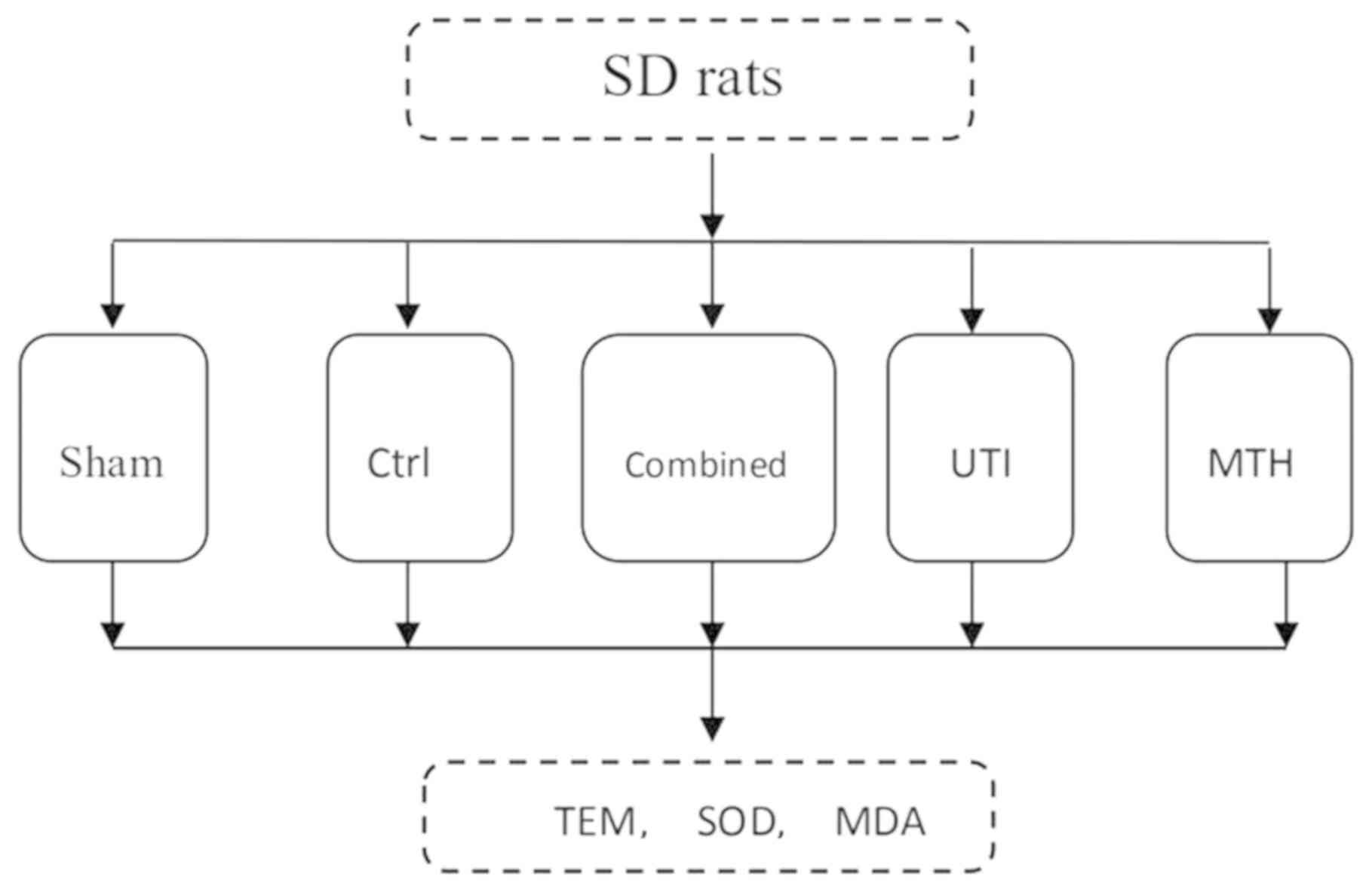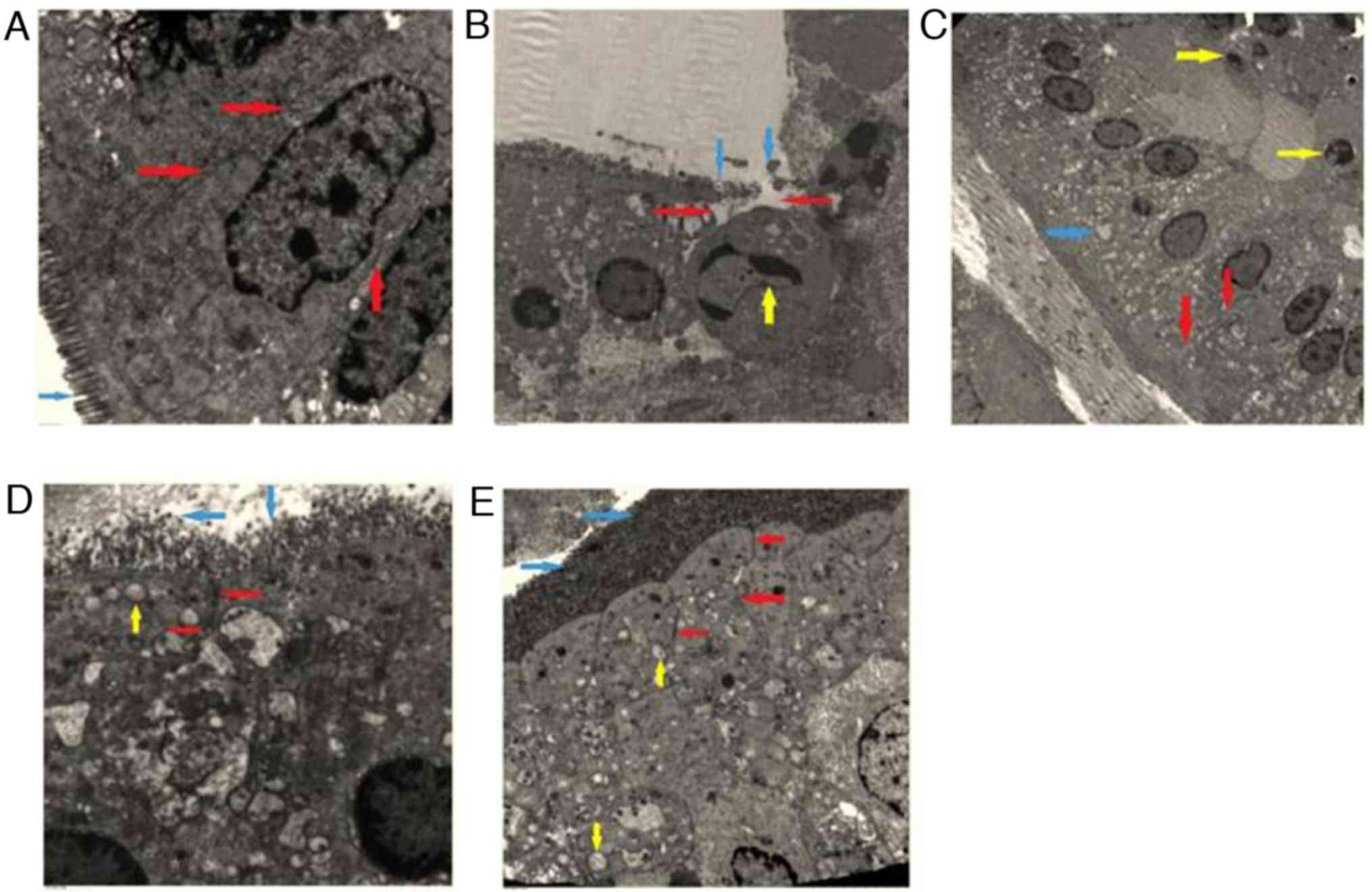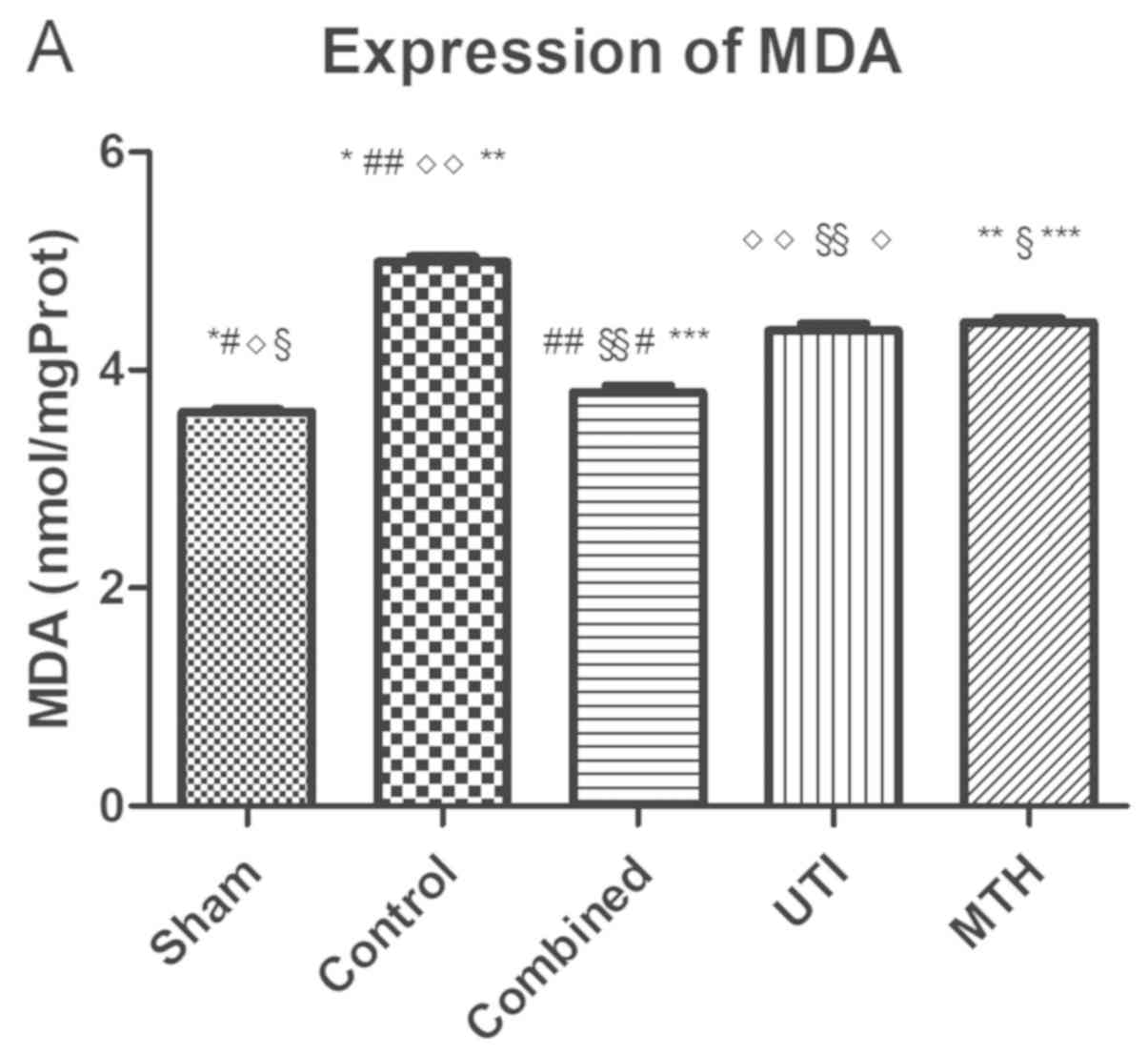|
1
|
Nichol G, Thomas E, Callaway CW, Hedges J,
Powell JL, Aufderheide TP, Rea T, Lowe R, Brown T, Dreyer J, et al:
Regional variation in out-of-hospital cardiac arrest incidence and
outcome. JAMA. 300:1423–1431. 2008. View Article : Google Scholar : PubMed/NCBI
|
|
2
|
Zhu A and Zhang J: Meta-analysis of
outcomes of the 2005 and 2010 cardiopulmonary resuscitation
guidelines for adults with in-hospital cardiac arrest. Am J Emerg
Med. 34:1133–1139. 2016. View Article : Google Scholar : PubMed/NCBI
|
|
3
|
Nolan JP, Laver SR, Welch CA, Harrison DA,
Gupta V and Rowan K: Outcome following admission to UK intensive
care units after cardiac arrest: A secondary analysis of the ICNARC
Case Mix programme database. Anaesthesia. 62:1207–1216. 2007.
View Article : Google Scholar : PubMed/NCBI
|
|
4
|
Stub D, Bernard S, Duffy SJ and Kaye DM:
Post cardiac arrest syndrome: A review of therapeutic strategies.
Circulation. 123:1428–1435. 2011. View Article : Google Scholar : PubMed/NCBI
|
|
5
|
Wang Z, Ye Z, Huang G, Wang N, Wang E and
Guo Q: Sevoflurane Post-conditioning enhanced hippocampal neuron
resistance to global cerebral ischemia induced by cardiac arrest in
rats through PI3K/Akt survival pathway. Front Cell Neurosci.
10:2712016. View Article : Google Scholar : PubMed/NCBI
|
|
6
|
Nolan JP, Neumar RW, Adrie C, Aibiki M,
Berg RA, Bbttiger BW, Callaway C, Clark RS, Geocadin RG, Jauch EC,
et al: Post-cardiac arrest syndrome: Epidemiology, pathophysiology,
treatment, and prognostication. A scientific statement from the
international liaison committee on resuscitation; the american
heart association emergency cardiovascular care committee; the
council on cardiovascular surgery and anesthesia; the council on
cardiopulmonary, perioperative, and critical care; the council on
clinical cardiology; the council on stroke. Resuscitation.
79:350–379. 2008. View Article : Google Scholar : PubMed/NCBI
|
|
7
|
Korth U, Krieter H, Denz C, Janke C,
Ellinger K, Bertsch T, Henn C and Klein J: Intestinal ischaemia
during cardiac arrest and resuscitation: Comparative analysis of
extracellular metabolites by microdialysis. Resuscitation.
58:209–217. 2003. View Article : Google Scholar : PubMed/NCBI
|
|
8
|
Pan H, Chen D, Liu B, Xie X, Zhang J and
Yang G: Effects of sodium hydrosulfide on intestinal mucosal injury
in a rat model of cardiac arrest and cardiopulmonary resuscitation.
Life Sci. 93:24–29. 2013. View Article : Google Scholar : PubMed/NCBI
|
|
9
|
Stallion A, Kou TD, Latifi SQ, Miller KA,
Dahms BB, Dudgeon DL and Levine AD: Ischemia/reperfusion: A
clinically relevant model of intestinal injury yielding systemic
inflammation. J Pediatr Surg. 40:470–477. 2005. View Article : Google Scholar : PubMed/NCBI
|
|
10
|
Hypothermia after Cardiac Arrest Study
Group, : Mild therapeutic hypothermia to improve the neurologic
outcome after cardiac arrest. N Engl J Med. 346:549–556. 2002.
View Article : Google Scholar : PubMed/NCBI
|
|
11
|
Bernard SA, Gray TW, Buist MD, Jones BM,
Silvester W, Gutteridge G and Smith K: Treatment of comatose
survivors of out-of-hospital cardiac arrest with induced
hypothermia. N Engl J Med. 346:557–563. 2002. View Article : Google Scholar : PubMed/NCBI
|
|
12
|
Nolan JP, Hazinski MF, Aickin R, Bhanji F,
Billi JE, Callaway CW, Castren M, de Caen AR, Ferrer JM, Finn JC,
et al: Part 1: Executive summary: 2015 International consensus on
cardiopulmonary resuscitation and emergency cardiovascular care
science with treatment recommendations. Resuscitation. 95:e1–e31.
2015. View Article : Google Scholar : PubMed/NCBI
|
|
13
|
Feng W, Jin L, Xie Q, Huang L, Jiang Z, Ji
Y, Li C, Yang L and Wang D: Eugenol protects the transplanted heart
against ischemia/reperfusion injury in rats by inhibiting the
inflammatory response and apoptosis. Exp Ther Med. 16:3464–3470.
2018.PubMed/NCBI
|
|
14
|
Albrecht M, Gruenewald M, Zitta K,
Zacharowski K, Scholz J, Bein B and Meybohm P: Hypothermia and
anesthetic postconditioning influence the expression and activity
of small intestinal proteins possibly involved in
ischemia/reperfusion-mediated events following cardiopulmonary
resuscitation. Resuscitation. 83:113–118. 2012. View Article : Google Scholar : PubMed/NCBI
|
|
15
|
Yang GS, Zhou XY, An XF, Liu XJ, Zhang YJ
and Yu D: mTOR is involved in stroke-induced seizures and the
anti-seizure effect of mild hypothermia. Mol Med Rep. 17:5821–5829.
2018.PubMed/NCBI
|
|
16
|
Inoue K and Takano H: Urinary trypsin
inhibitor as a therapeutic option for endotoxin-related
inflammatory disorders. Expert Opin Investig Drugs. 19:513–520.
2010. View Article : Google Scholar : PubMed/NCBI
|
|
17
|
Karnad DR, Bhadade R, Verma PK, Moulick
ND, Daga MK, Chafekar ND and Iyer S: Intravenous administration of
ulinastatin (human urinary trypsin inhibitor) in severe sepsis: A
multicenter randomized controlled study. Intensive Care Med.
40:830–838. 2014. View Article : Google Scholar : PubMed/NCBI
|
|
18
|
Yang B, Gao M, Wang K, Jiang Y, Peng Y,
Zhang H, Yang M and Xiao X: Intraintestinal administration of
ulinastatin protects against sepsis by relieving intestinal damage.
J Surg Res. 211:70–78. 2017. View Article : Google Scholar : PubMed/NCBI
|
|
19
|
Sui B, Li Y and Ma L: Postconditioning
improvement effects of ulinastatin on brain injury following
cardiopulmonary resuscitation. Exp Ther Med. 8:1301–1307. 2014.
View Article : Google Scholar : PubMed/NCBI
|
|
20
|
Jiang XM, Hu JH, Wang LL, Ma C, Wang X and
Liu XL: Ulinastatin alleviates neurological deficiencies evoked by
transient cerebral ischemia via improving autophagy, Nrf-2-ARE and
apoptosis signals in hippocampus. Physiol Res. 67:637–646. 2018.
View Article : Google Scholar : PubMed/NCBI
|
|
21
|
Zhang Y, Zeng Z, Cao Y, Du X and Wan Z:
Effect of urinary protease inhibitor (ulinastatin) on
cardiopulmonary bypass: A meta-analysis for China and Japan. PLoS
One. 9:e1139732014. View Article : Google Scholar : PubMed/NCBI
|
|
22
|
Han F, Boller M, Guo W, Merchant RM, Lampe
JW, Smith TM and Becker LB: A rodent model of emergency
cardiopulmonary bypass resuscitation with different temperatures
after sphyxial cardiac arrest. Resuscitation. 81:93–99. 2010.
View Article : Google Scholar : PubMed/NCBI
|
|
23
|
Ghali MG and Marchenko V: Dynamic changes
in phrenic motor output following high cervical hemisection in the
decerebrate rat. Exp Neurol. 271:379–389. 2015. View Article : Google Scholar : PubMed/NCBI
|
|
24
|
He W, Liu Y, Geng H and Li Y: The
regulation effect of ulinastatin on the expression of SSAT2 and
AQP4 in myocardial tissue of rats after cardiopulmonary
resuscitation. Int J Clin Exp Pathol. 8:10792–10799.
2015.PubMed/NCBI
|
|
25
|
Chiu CJ, McArdle AH, Brown R, Scott HJ and
Gurd FN: Intestinal mucosal lesion in low-flow states. I. A
morphological, hemodynamic, and metabolic reappraisal. Arch Surg.
101:478–483. 1970. View Article : Google Scholar : PubMed/NCBI
|
|
26
|
Katsoulis IE, Balanika A, Sakalidou M,
Gogoulou I, Stathoulopoulos A and Digalakis MK: Extensive colonic
necrosis following cardiac arrest and successful cardiopulmonary
resuscitation: Report of a case and literature review. World J
Emerg Surg. 7:352012. View Article : Google Scholar : PubMed/NCBI
|
|
27
|
Turner JR: Intestinal mucosal barrier
function in health and disease. Nat Rev Immunol. 9:799–809. 2009.
View Article : Google Scholar : PubMed/NCBI
|
|
28
|
Liu Q, Peng J, Zhou Y, Zeng W, Xiao S,
Cheng H, Zhong Z, Liao X, Xiao X, Luo L and Liu X: Clinical
observation of ulinastatin combined with CRRT in the treatment of
early cardiopulmonary resuscitation. Exp Ther Med. 14:6064–6068.
2017.PubMed/NCBI
|
|
29
|
Liu S, Xu J, Gao Y, Shen P, Xia S, Li Z
and Zhang M: Multi-organ protection of ulinastatin in traumatic
cardiac arrest model. World J Emerg Surg. 13:512018. View Article : Google Scholar : PubMed/NCBI
|
|
30
|
Sasaki M and Joh T: Oxidative stress and
ischemia-reperfusion injury in gastrointestinal tract and
antioxidant, protective agents. J Clin Biochem Nutr. 40:1–12. 2007.
View Article : Google Scholar : PubMed/NCBI
|
|
31
|
Qian ZY, Yang MF, Zuo KQ, Xiao HB, Ding WX
and Cheng J: Protective effects of ulinastatin on intestinal injury
during the perioperative period of acute superior mesenteric artery
ischemia. Eur Rev Med Pharmacol Sci. 18:3726–3732. 2014.PubMed/NCBI
|
|
32
|
Tian YF, Li Y, Zhao Q, Fan LQ, Zhao WJ, Xu
BL, Song ZC, Kuang G, Dong ZM and Zhang QF: Effect of ulinastatin
on intestinal mucosal barrier function of rats with obstructive
jaundice. Nan Fang Yi Ke Da Xue Xue Bao. 27:987–990. 2007.(In
Chinese). PubMed/NCBI
|
|
33
|
Ivary SHA, Jajarmy N, Shahri MK, Shokoohi
M, Shoorei H, Ebadi A, Moghimian M and Sigaroodi F: Effect of fish
and flaxseed oil supplementation on isoprenaline-induced myocardial
infarction in rats: Inhibition of mitochondrial permeability
transition pore opening. Crescent J Med Biol Sci. 6:158–163.
2019.
|
|
34
|
Zhang YJ, Li M, Meng M, Feng M and Qin CY:
The effect of ulinastatin on the small intestine injury and mast
cell degranulation in a rat model of sepsis induced by CLP. Exp
Toxicol Pathol. 61:481–490. 2009. View Article : Google Scholar : PubMed/NCBI
|
|
35
|
Stefanutti G, Pierro A, Parkinson EJ,
Smith VV and Eaton S: Moderate hypothermia as a rescue therapy
against intestinal ischemia and reperfusion injury in the rat. Crit
Care Med. 36:1564–1572. 2008. View Article : Google Scholar : PubMed/NCBI
|
|
36
|
Yang GS, Zhou XY, An XF, Liu XJ, Zhang YJ
and Yu D: Mild hypothermia inhibits the Notch 3 and Notch 4
activation and seizure after stroke in the rat model. Pathol Res
Pract. 214:1008–1016. 2018. View Article : Google Scholar : PubMed/NCBI
|
|
37
|
Oliveira JC, Oliveira CH, Oliveira HE,
Pereira A, Maraschin M and D'Acampora AJ: Effects of perioperative
hypothermia and reactive oxygen species in the healing of colonic
anastomosis in rats. Acta Cir Bras. 29:742–747. 2014. View Article : Google Scholar : PubMed/NCBI
|


















